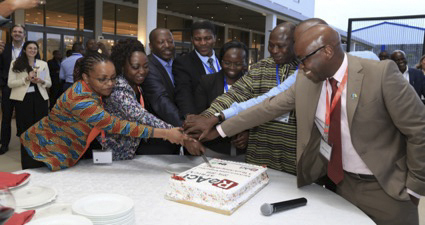2020-11-16
ReAct Africa and South Centre will host this year’s annual conference virtually as a result of COVID-19 restrictions on public gatherings and travel. The conference will be held from 1-4 December under the theme, “What is the status of the Antimicrobial Resistance National Action Plans in the African Region?”

For most African countries, National Action Plans on Antimicrobial Resistance (NAPs on AMR) were developed in 2017. Almost 3 years into the process, implementation for some countries continues to be a challenge. The objective of the conference is to establish what progress has been made in specific countries and will serve as a platform to share best practices and lessons learnt. This will be accomplished through presentations from ten selected countries; five anglophone, five francophone. This conference will also host round table discussions with the regional Tripartite Plus (OIE, WHO-AFRO, FAO, UNEP) and funders such as, ICARS, Wellcome Trust, Fleming Fund, and The World Bank among other intergovernmental organizations.
Bringing stakeholders from across the globe together
The conference is expected to bring together AMR experts, civil society organisations, academia, government ministries and research institutions to discuss regional progress, challenges, approaches and next steps in addressing antimicrobial resistance. Participation from around the world is expected as the invitation to attend is open to all. The conference will be held 1-4 December 13:00 -15:30 hrs CAT.
The specific country presentations will provide a forum for participants to network and enhance north to south, south to north and south to south exchanges. The conference will provide participants with global governance updates surrounding antimicrobial resistance, as addressing antimicrobial resistance requires global coordination and collaboration.
2019 conference: 120 participants from 33 countries

The 2019 conference held under the theme “Achieving Universal Health Coverage while addressing Antimicrobial Resistance” had over 120 multi-sector participants from 33 countries. The three day event covered a variety of topics in the context of AMR and efforts towards the attainment of Universal Health Coverage. In regards to the National Action Plans on AMR, the conference revealed that a number of African countries were making progress in the development and implementation process. However, it also highlighted the need to offer technical and financial support to countries in their NAP implementation efforts.
Three key takeaways from the ReAct Africa conference 2019
Upcoming 2019 ReAct Africa Conference and reflections from 2018 conference
More news and opinion from 2020
- Nurse Dorce, Indonesia: Treating small patients with much love and infection prevention – a success story
- ReAct highlights during World Antimicrobial Awareness week 2020
- ReAct Asia Pacific: Winners of 2020 photography competition
- WAAW ReAct Africa: Engaging civil society and students
- WAAW in Indonesia: Focus on One Health approach to AMR
- Innovate4Health’s 32 finalist teams: For social innovations to address emerging infectious diseases!
- ReAct Open Letter: 5 key points to One Health Global Leaders Group on Antimicrobial Resistance
- ReAct Report: Treatment of newborn sepsis is threatened – effective antibiotics essential
- Upcoming ReAct Africa Conference: What is the status of the NAPs on AMR in the African region?
- Animal welfare and antibiotic resistance in food animals
- ReAct activities for World Antimicrobial Awareness Week 2020
- Dr. Honar Cherif: My patients can receive 5-10 courses of antibiotics during their cancer treatment
- New ReAct Report: Antibiotic resistance affects men and women differently
- ReAct Asia Pacific: Photo competition for students – health in focus
- 4 take aways from WHO’s first global report on sepsis
- Launch of global student design sprint – Innovate4Health
- World Sepsis Day – antibiotics essential in treatment of sepsis
- The new Pharmaceutical Strategy for Europe – an opportunity to put public interest first
- 4 key reflections on the recently launched WHO GLASS-report
- Key points from ReAct’s comments to the Independent Panel on Evidence
- ReAct Interview: From zoologist to community engagement on AMR
- ReAct Africa expands
- COVID-19 resolution – a missed opportunity to address global pandemic response more broadly
- What everyone needs to know about clinical research
- New ReAct Policy Brief: Successful cancer treatment relies on effective antibiotics
- Impact of COVID-19 on vaccine-preventable diseases and antibiotic resistance
- ReAct Africa and Africa CDC: COVID-19 webinars
- Antibiotic pollution: India scores a global first with effluent limits
- COVID-19 and AMR – what do we know so far?
- Learning from bedaquiline in South Africa – comprehensive health systems for new antibiotics
- ReAct Interview: How does antibiotics in food animal production end up in the environment?
- Key take aways from CSO workshop on AMR in Kenya
- New fact sheet: Effective antibiotics – essential for childrens’ survival
- Shortages and AMR – why should we care? 4 consequences of antibiotic shortages
- Our microbiome and noncommunicable diseases
- The 2020 AMR Benchmark Report – concerning findings with questionable framing
- 4 key reflections from engaging hospitals in India for antibiotic stewardship
- Teacher Gustavo Cedillo, Ecuador, teaches children about the bacterial world
